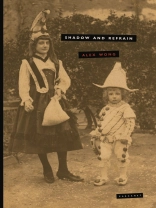Alex Wong’s first collection, Poems Without Irony (2016), was a book that took nothing for granted, that broke through to the particularity of things and experiences, distrusting and defying generality. Elaine Feinstein celebrated the ‘extraordinarily new rhetoric for his love poetry’ whilst David Morley commended his ‘linguistic finesse’.Shadow and Refrain presses on, less coyly, with similar themes and a tenacious syntax that gorgeously persists until it has secured its quarry, the long sentences – sometimes running through several stanzas – asking to be read aloud to be secured. As the poet insists, ‘These poems are designed to be read using the mouth’ – for sensation even if not for fully voiced sound. This book, like the first, is troubled by the difficulty of frank expression in the more private nooks of day-to-day life, and is driven to find curious routes into the centres of experiences that resist simpler articulation. Some poems are imagined addresses to inaccessible friends, or engagements with significant places and objects. Intimacy is repeatedly probed, the processes by which it can be attained and lost, the preoccupations it brings with it and leaves behind.
Giới thiệu về tác giả
Alex Wong was born in 1988 in London, where for the most part he was schooled, though he spent much of his childhood in O’ahu, Hawai’i. He studied and now teaches English literature at the University of Cambridge. Poems Without Irony, his first collection of poetry, was pub- lished by Carcanet in 2016, and his original and translated verse has appeared in PN Review, New Poetries VI, The Forward Book of Poetry 2018, and elsewhere. He also edits and introduces the Selected Verse of Algernon Charles Swinburne and the Selected Essays of Walter Pater for Carcanet Classics. He is the author of a critical book, The Poetry of Kissing in Early Modern Europe (2017), and his studies of English literature have appeared in various periodicals. Shadow and Refrain is his second collection of poems.












